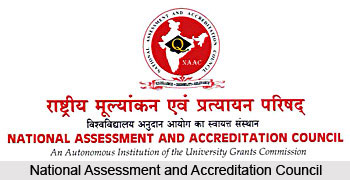 The National Assessment and Accreditation Council (NAAC) is an autonomous body established by the University Grants Commission (UGC) of India to assess and accredit institutions of higher education in the country. It is an outcome of the recommendations of the National Policy in Education (1986) that laid special emphasis on upholding the quality of higher education in India.
The National Assessment and Accreditation Council (NAAC) is an autonomous body established by the University Grants Commission (UGC) of India to assess and accredit institutions of higher education in the country. It is an outcome of the recommendations of the National Policy in Education (1986) that laid special emphasis on upholding the quality of higher education in India.
Formation of NAAC
The system of higher education in India has expanded rapidly during the last fifty years. In spite of the built-in regulatory mechanisms that ensure satisfactory levels of quality in the functioning of higher education institutions, there have been criticisms that the country has permitted the mushrooming of institutions of higher education with fancy programme and substandard facilities and consequent dilution of standards. To address the issues of deterioration in quality, the National Policy on Education (1986) and the Plan of Action (POA-1992) that spelt out the strategic plans for the policies, advocated the establishment of an independent national accreditation body. Consequently, the NAAC was established in 1994 with its headquarters at Bengaluru.
Governance of NAAC
The NAAC functions through its General Council (GC) and Executive Committee (EC) where educational administrators, policy makers and senior academicians from a cross -section of the system of higher education are represented. The Chairperson of the UGC is the President of the GC of the NAAC, the Chairperson of the EC is an eminent academician in the area of relevance to the NAAC. The Director of the NAAC is its academic and administrative head, and is the member-secretary of both the GC and EC. The NAAC also has many advisory and consultative committees to guide its practices, in addition to the statutory bodies that steer its policies. The NAAC has a core staff and consultants to support its activities. It also receives assistance from a large number of external resource persons from across the country who are not full time staff of the NAAC.
Objectives of NAAC
The activities and future plans of the NAAC are guided by its vision and mission that focus on making quality assurance an integral part of the functioning of higher education institutions. The NAAC has the following prime objectives: to make quality the defining element of higher education in India through a combination of self and external quality evaluation, promotion and sustenance initiatives; to arrange for periodic assessment and accreditation of institutions of higher education or units thereof, or specific academic programme or projects; to stimulate the academic environment for promotion of quality of teaching-learning and research in higher education institutions; to encourage self-evaluation, accountability, autonomy and innovations in higher education; to undertake quality-related research studies, consultancy and training programme; to collaborate with other stakeholders of higher education for quality evaluation, promotion and sustenance.
Guided by its vision and striving to achieve its mission, the NAAC primarily assesses the quality of institutions of higher education that volunteer for the process, through an internationally accepted methodology. For the assessment of a unit, the NAAC follows a three-stage process which is a combination of self-study and peer review. The three stages are:
* The preparation and submission of a self-study report by the unit of assessment.
* The on-site visit of the peer team for validation of the self-study report and for recommending the assessment outcome to the NAAC.
* The final decision by the Executive Committee of the NAAC.
* The self-study report to be validated by peers is the backbone of the whole exercise. Manuals have been developed to suit different units of higher education, with detailed guidelines on the preparation of the self-study report and the other aspects of assessment and accreditation.






